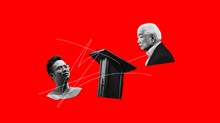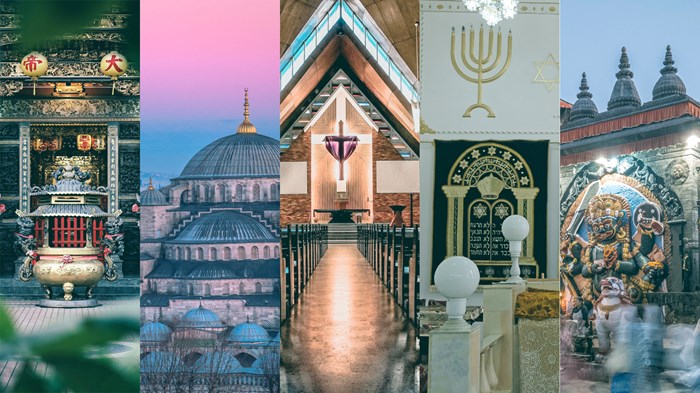
Despite signs of increasing secularism in the United States, far more Americans favor an increased role for religion in society than oppose it.
According to a massive new report from the Pew Research Center that queried more than 30,000 people across 27 countries, almost three times as many Americans say they would view “a more important role for religion” in the US as a positive change (51%) versus a negative change (18%).
In general, that sentiment is shared around the globe—at the same rate. Across all countries surveyed, a median of 39 percent of respondents favor religion becoming more important in society, while only 13 percent oppose it.
Only 5 of the 27 countries surveyed have populations in which those opposed to religion playing a more important role outnumber those in favor. All 5 are in Europe: Sweden (51%), France (47%), the Netherlands (45%), Germany (35%), and Spain (38%), where an openly atheist prime minister was elected last year amid concerns over his vows to remove religious symbolism from institutions and religion from school curriculums.
In the African nations of Nigeria, Kenya, South Africa, and Tunisia, along with other countries in the global south such as Indonesia and Brazil, the idea of religion gaining more importance in society is viewed favorably by large majorities of the population.
Pew highlighted one country where views vary by religion: Nigeria, which continues to be rocked by deadly sectarian conflict.
“The vast majority of Nigerian Muslims (88%) are in favor of a more important role for religion, while a smaller majority of Christians (61%) say the same,” stated researchers. “However, it’s important to note that roughly a quarter of Christian respondents (26%) say there has been no change in the relative importance of religion in Nigeria, compared with 5% of Nigerian Muslims.”
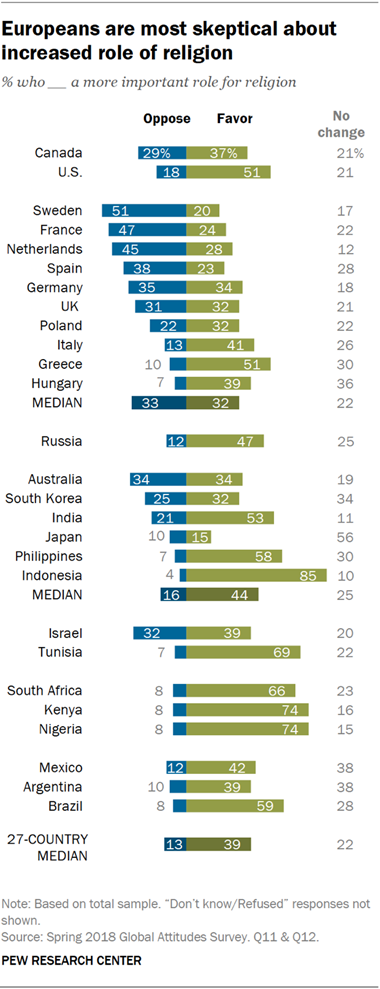
With religious tensions and restrictions continuing to rise worldwide, as analyzed by Pew, this latest report offers a window into how citizens in affected nations feel about religion gaining prominence.
Nigeria, where approximately half the population identifies as Christian, is ranked No. 12 on the 2019 World Watch List (WWL), a report from Open Doors ranking the countries where it is most dangerous to be a follower of Jesus. A full 65 percent of all Nigerians say religion is gaining importance in their country, and 74 percent favor it taking on an even greater role.
In India, ranked No. 10 on the WWL and where Christians comprise less than 5 percent of the population, half of all Indians say religion has grown more prominent in their society (54%) and half favor its continued rise (53%).
Indonesia may present the starkest case. Ranked No. 30 on the WWL, 83 percent of all Indonesians say religion has taken on more importance in the last 20 years. Only 6 percent say religion has faded. In the island nation, 85 percent want religion to continue to ascend to a more prominent place, the greatest percentage of any nation measured. Only 4 percent would like to see religion in society scaled back.
Especially in North America, Europe, and Australia, whether or not people want to see religion take on a more significant role in society is strongly linked with another social factor: political ideology.
Americans who identify as somewhat or very conservative, for instance, are 42 percentage points more likely that left-leaning Americans to favor an increased role for religion in society. That is by far the largest political divide between the political right and left across all countries measured.
Canada and Poland exhibit the next-largest political divides, with conservatives favoring a larger role for religion at a rate 25 percentage points higher than the political left.
In addition to the political divide, there is also an age gap between those supportive of a more important role for religion. In 10 of the countries surveyed, older adults (over the age of 50) favor an increased role for religion at notably higher rates than younger adults (between 18 and 29).
Italy, where Mass attendance is in decline, features the biggest difference, with a 25 percentage-point gap between older and younger Italians. In the US, the gap is 22 percentage points.
Bucking the trend, however, is the Philippines, where young adults are actually more in favor of an increased role for religion by 15 percentage points over their parents’ generation.
While a minority of people in the US and around the world voice opposition to an increased role for religion in society, considerably more believe the importance of religion in their countries is indeed on the decline.
A median of 37 percent say religion plays a less important role in their countries today than it did 20 years ago, while 27 percent of respondents say religion now plays a more important role. (About 1 in 5 say there has been no change.)
Countries around the world differ sharply in the perceived rise or fall of the importance of religion in the last two decades. For instance, only a fraction of the populations of Spain (7%) and Japan (8%) say religion has grown in importance. The trend is the reverse in Muslim-majority Indonesia where, as noted above, 83 percent of people agree that religion has taken on new importance in society.
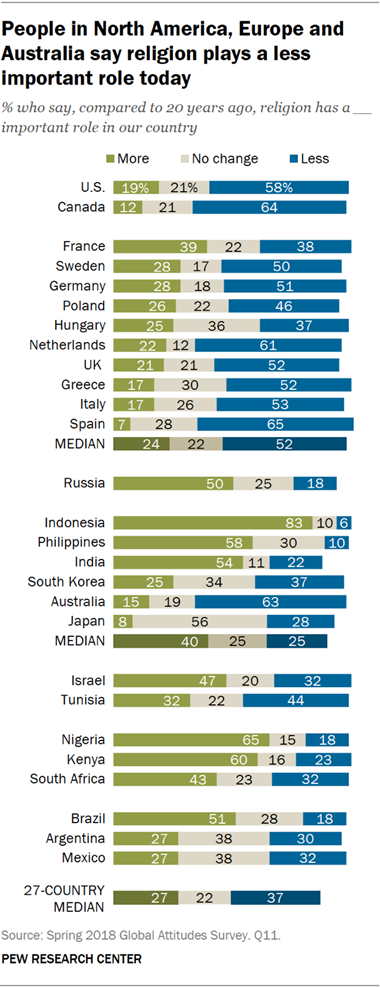
The recent Indonesian election proves the point, as first results appear to have returned President Joko “Jokowi” Widodo to another term in power, this time with a 76-year-old Muslim cleric as his running mate. Political and religious conservatism is on the rise in the Southeast Asian nation, the fourth-most populous country in the world, where the Christian former governor of Jakarta, popularly known as Ahok, was only recently released from prison after serving a two-year prison sentence on charges of blasphemy.
Also in the Global South, large percentages of respondents in the Philippines (58%), as well as Nigeria (65%) and India (54%) noted above, believe religion impacts their lives and societies more now than it did two decades ago. Notably, strong majorities in each of these countries also say religion is very important in their personal lives.
“There is a strong correlation between those who see religion’s role in society growing and those who think religion is very important in their lives,” state the study’s authors.
In the West, people in North America and Europe are very likely to say religion’s role in society has diminished in the last 20 years. In the US, nearly 6 in 10 (58%) say religion plays a less important role in the country than it did at the turn of the century. About half of Europeans (52%) say the same of their own countries.
The study also found that most people believe diversity and gender equality have increased in their nations over the past 20 years while family ties have weakened significantly. About 1 in 5 believe there has been no change on these aspects of society. Opinions were less divided than on the religion questions.
Pew researchers concluded that “people are strongly in favor of increased gender equality but share more tepid enthusiasm for increased ethnic, religious, and racial diversity. And despite secularization trends, most across the 27 countries surveyed do not oppose a more important role for religion in their society.”
Countries surveyed include the United States, Canada, the Netherlands, the United Kingdom, Spain, France, Germany, Sweden, Hungary, Greece, Poland, Italy, Russia, Indonesia, the Philippines, India, Australia, South Korea, Japan, Israel, Tunisia, Nigeria, Kenya, South Africa, Mexico, Argentina, and Brazil.
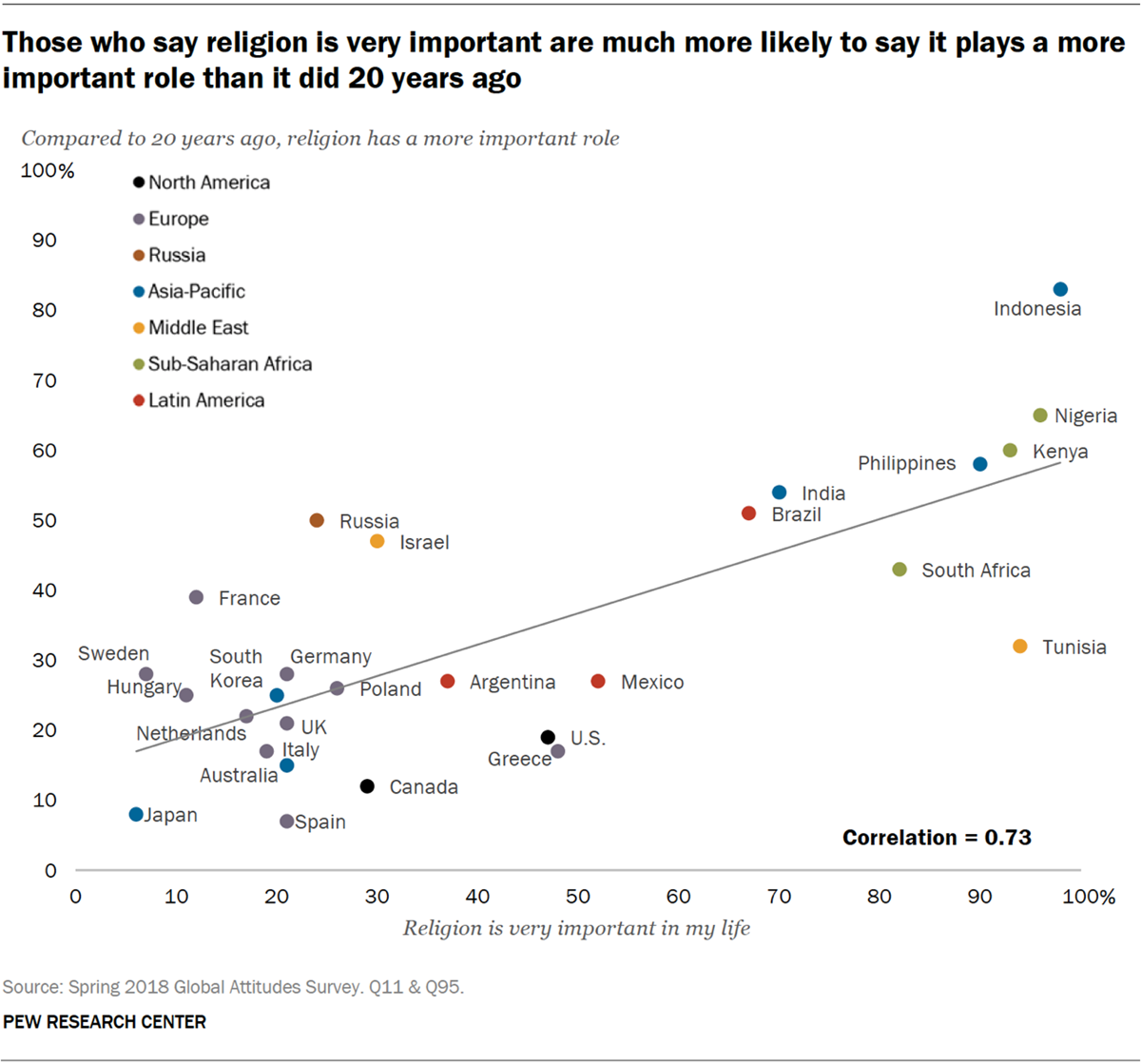

Support Our Work
Subscribe to CT for less than $4.25/month









